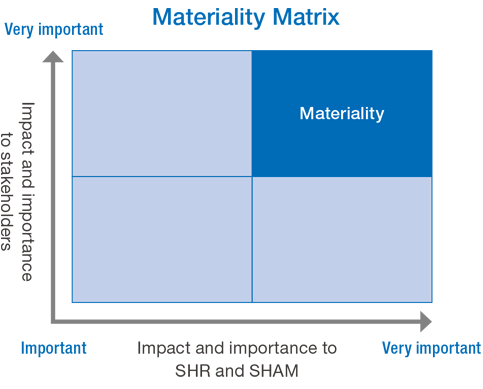Materiality (Important Issues)
- Home
- ESG Initiatives
- Materiality (Important Issues)
Materiality Identification Process
In 2020, SHR has identified our materiality in accordance with the following process with the aim of promoting more concrete initiatives for sustainability through our business activities.
Even after the identification of materiality, the environment surrounding stakeholders and SHR is expected to change over the medium to long term. By periodically reviewing the materiality in accordance with these trends and pursuing the sustainability of SHR in a manner that meets the demands of society, we will fulfill our responsibility toward the mutual sustainable growth of society and SHR.
Step1 Classification of Issues
List of issues, which should be considered in the sustainable growth of SHR and SHAM by referring to the international targets such as SDGs (Sustainable Development Goals), guidelines like GRI Standards etc. and assessments by ESG evaluation organizations.
Step2 Prioritization
Of the identified items, the issues to be focused on were prioritized by incorporating them into Materiality Matrix from the perspective of impact and importance to stakeholders and impact and importance to SHR and SHAM.

Step3 Identification and Approval
Identify and approve prioritized materiality candidates after discussing their validity by Sustainability Committee.
Step4 Progress Review
Confirm the status of initiatives for materialities and evaluate the outcome in Sustainability Committee, also continue implementation of improvement activities through PDCA cycle and promote initiatives.
Materiality (Important Issues)
SHR believes that sustainable growth in our business activities is built on a solid foundation of a sustainable society, and recognize that in order to continue providing "Prime Properties", which SHR focuses on as an investment strategy, it is necessary to carry out initiatives based on the guidelines of solving issues to build a sustainable society through business activities. Based on this recognition, SHR has identified eight materialities (important issues) as below and sets targets (KPIs) as indicators to resolve each of them. In light of the SDGs adopted by the United Nations in 2015, we will pursue mutual sustainability of both society and SHR by promoting efforts to resolve materiality.
Materiality of SHR
In light of changes in the environment, society and economy, SHAM reviewed some phrasing of the identified materiality along with the reassessment and addition of targets (KPIs) as of March 2022.
| Materiality | Target (KPI) | Related SDGs | |
|---|---|---|---|
| Environment | Promoting Response to Climate Change | Reduce 50% CO₂ emission intensity of portfolio by FY 2030 compared to FY 2018 | |
| Reduce 5% energy consumption intensity of portfolio by FY 2023 (Note 1) compared to FY 2018 | |||
| Promote green lease | |||
| Coexistence of Humankind and Nature and Activities for the Resources Environment | Advance greenification and respect biodiversity | ||
| No increasing waste emission intensity of portfolio compared to FY 2018 | |||
| No increasing water use intensity of portfolio compared to FY 2018 | |||
| Investing in Real Estate with Excellent Environmental Performance | Achieve 70% or more of the portfolio with green certification by FY 2022 (Note 2) | ||
| Promote ZEH initiatives | |||
| Social | Providing Residents and Tenants with Secure and Comfortable Space that Offers Peace of Mind | Periodic surveys on resident and tenant satisfaction and promote initiatives to improve satisfaction | |
| Promote certification acquisition for comfort and health of buildings (spaces) | |||
| Periodic assessment of earthquake risk and flood damage risk and the implementation of measures to reduce such risk | |||
| Periodic assessment of initiatives toward ESG in the supply chain and the promotion of collaborative initatives | |||
| Contributions to Society | As a member of society, contributing to greater vitality in the community and countermeasures aimed at preventing damage from natural and other disasters | ||
| By FY 2023, "Sekisui House Matching Program" (a joint donation system for employees and the company) participation rate: 40% | |||
| Creating a Rewarding Workplace | By FY 2023, Percentage of female managers: 7% Average monthly work hours per person: 162 hours Take-up rate for male childcare leave: 100% Annual paid leave take-up rate: 70% |
||
| Annual participation in external training events per person: twice | |||
| Annual internal training participation rate: 100% | |||
| Practicing Sekisui House Group Human Rights Policy | |||
| Governance | Strengthening Corporate Governance System | Enhance effectiveness of executive committee and board of directors Conducting effectiveness evaluation questionnaire(once/year) |
|
| Penetration of compliance Conducting compliance training by external experts, etc.(four times/year)participation rate: 100% |
|||
| Strengthening internal controls structure Conducting internal audit(twice/year) |
|||
| Strengthen risk management system Conducting risk management meeting(twice/year) |
|||
| Information Disclosure and Engagement with Stakeholders | Timely and appropriate disclosure of information and enhanced utility of disclosures | ||
| Building relationships of trust with stakeholders | |||
- Will set reduction targets every 5 years after FY 2023 and continue promotion of reduction in energy consumption intensity of portfolio.
- Will continue to maintain 70% or more after FY 2022.